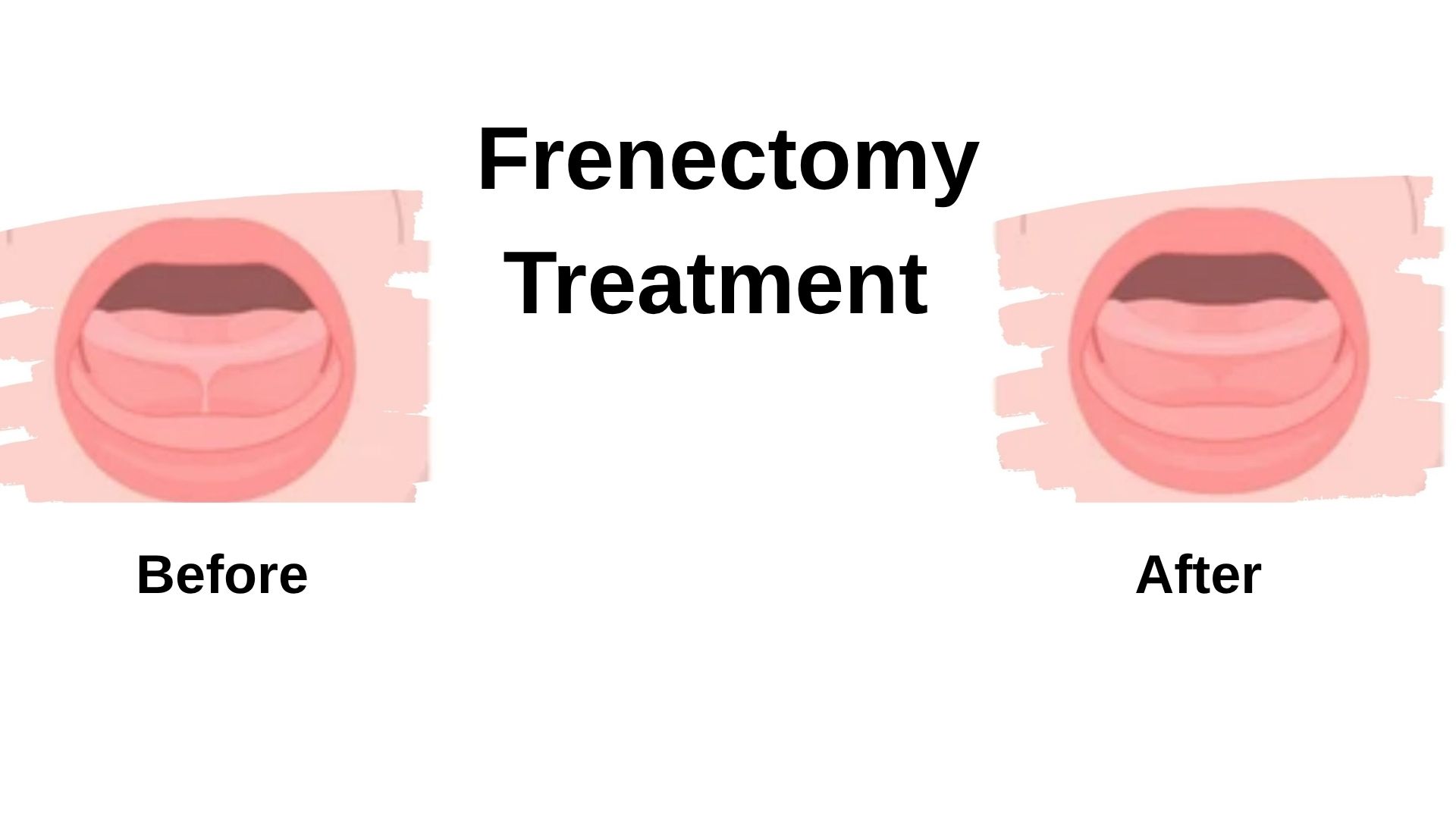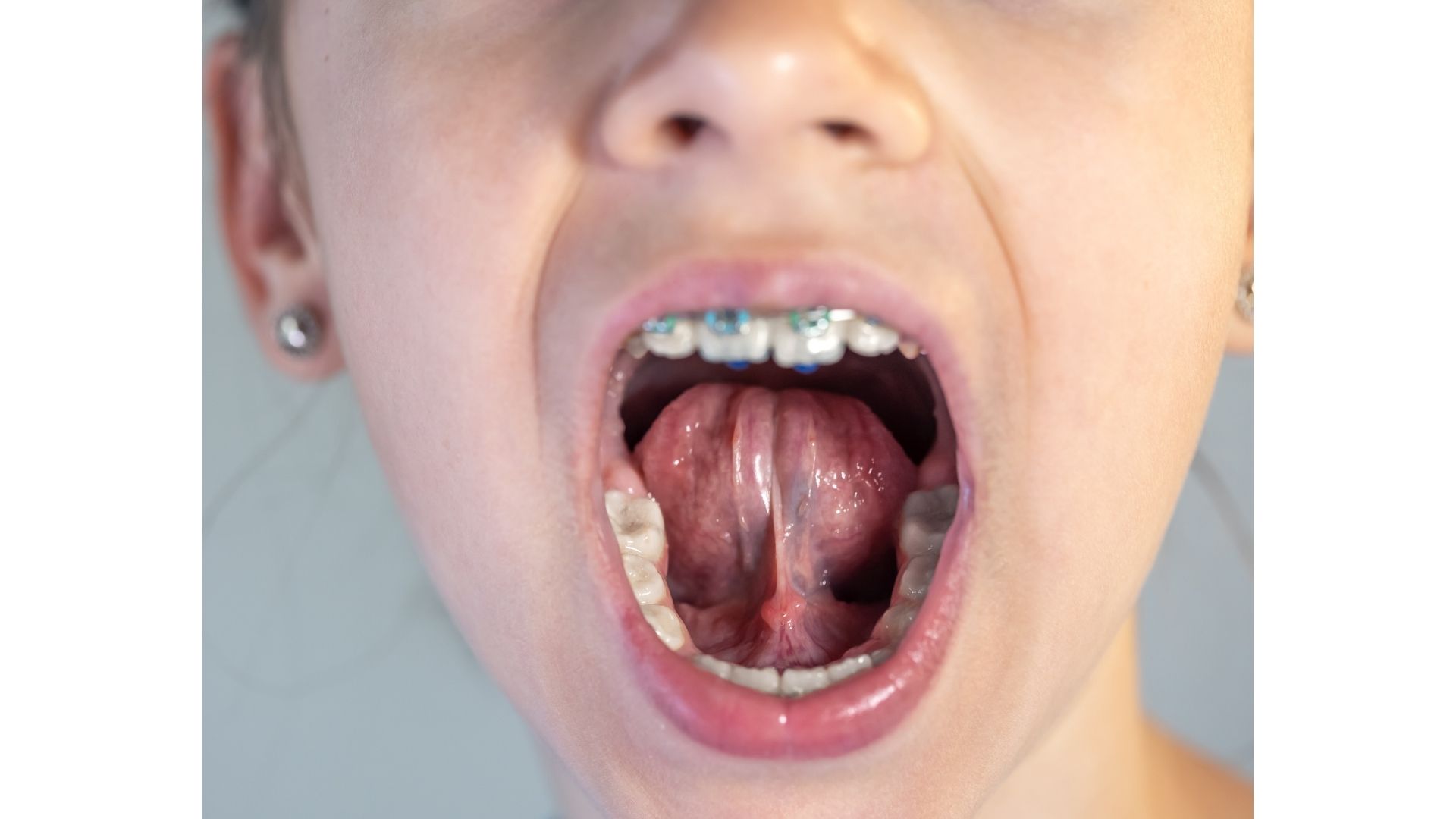Frenectomy, Lip Tie and Tongue Tie Removal in Turkey, Istanbul

The lip and tongue tie, medically known as frenectomy, is a thin, flexible tissue that extends from the inside of the lips to the gum. Both the lower and upper lip contain this tissue.
It is a natural part of the body, and everyone has this kind of formation in their mouth. However, in some people, this tissue may be thicker, shorter, or tighter than normal. A lip tie with these characteristics means that it has become uncomfortable for the person.
If the frenectomy is too short or tense, it prevents the lip from moving freely. This can cause some problems starting from infancy. For instance, babies may struggle to suck, kids may not be able to make certain sounds, or the gap between teeth may not close later. In other words, although the lip tie is a small piece of tissue, it is an important structure that can affect daily life.
What happens if a lip tie is not corrected?
If the lip tie is too tense and causes problems, some of them may become permanent over time if it is not removed. Malnutrition issues may arise if a baby's sucking disorder persists for an extended period of time. This situation both negatively affects the development of the baby and weakens the bond that the baby establishes with the mother during breastfeeding. For the mother, this situation is also exhausting. Calming a restless baby who cries constantly and is not satisfied is a challenging task.
In older children, lip bonding can affect speech. They may have difficulty in saying letters such as 'p', 'b', and 'm', in which the lip plays an active role. This is a negative situation that affects the child's self-confidence and makes it difficult for him/her to express himself/herself.
Another important problem is the gap between the teeth. Especially in the upper front teeth, if the lip ligament is too tense, the gap between the teeth is not closed. Even if this gap is closed with orthodontic treatment, if the lip tie is not removed, the teeth may separate again over time. In addition, this bond can also make it difficult to use dentures or prostheses.

What is a frenectomy? Frenectomy procedure to treat tongue-tie
What is a frenectomy? Frenectomy is the surgical cutting of the ligament under the lip or tongue. This procedure takes a very short time, usually between 5 and 10 minutes. During the procedure, the area is locally anaesthetised, i.e., only the area to be treated is numbed. Especially in children and babies, the procedure is performed very quickly, and often the child can continue to play as soon as it is finished.
In traditional methods, the surgeon cuts the connective tissue using a scalpel. This method may require stitches, and the healing process is a little longer. However, recently, laser frenectomy procedures have become much more common. In laser applications, bleeding is very little, there is no need for stitches and the risk of infection is minimal.
Laser frenectomy is a preferred procedure, especially in infants. Because the procedure is completed in a very short time, and the discomfort experienced by the baby is very little. In addition, the healing process is more comfortable in laser procedures. In many scientific publications, it has been observed that individuals undergoing laser frenectomy recover in a shorter time and experience less pain.
What is lip tie surgery?
Lip tie surgery is the procedure of cutting the frenulum, which is too tense between the lip and gum. The aim is to relieve the movement of the lip by eliminating the negative effects on the oral structure and to facilitate feeding and speaking.
This surgery can be performed on both children and adults. Infants with a sucking problem can undergo the procedure as early as the first weeks after birth. In children, the evaluation typically occurs during speech issues or dental treatment. In adults, it may be considered in terms of aesthetic concerns, orthodontic treatment or prosthesis compatibility.
The procedure is usually performed as outpatient treatment. In other words, hospitalisation is not required. After this intervention performed with a short-term local anaesthesia, the patient can return home immediately. Most of the time, laser procedures do not even require stitches.
Why do you need a frenectomy procedure?
Failure to perform a frenectomy, despite its recommended treatment, could result in persistent complaints over time. Continuous sucking problems in the baby may cause a decrease in the mother's milk production. The baby cannot reach the required weight due to malnutrition, and the breastfeeding process may end early. This is a stressful process for both mother and baby.
In older children, speech problems may not be noticed until school age. However, a child who has difficulty communicating with friends at school may experience a lack of self-confidence and social shyness. In addition, if the lip tie is not removed during the orthodontic treatment process, the gap between the teeth may open again.
In adults, the use of dentures may cause discomfort due to the pressure of the frenulum. Prosthetic teeth do not fit properly and cause constant irritation in the mouth. This can make even basic activities such as speaking and eating difficult.
What is the best age to fix a lip tie?
There is no clear answer to this question. The necessity differs among individuals. If a sucking problem is observed immediately after birth, frenectomy can be performed even in the first weeks. In these cases, the earlier the intervention, the better the sucking quality and milk intake.
If there is a problem with speech development, an assessment is usually carried out between 3 and 6 years of age. In this age group, children cooperate better, it is possible to work with speech therapists, and surgical interventions can be more planned.
If there is a gap in the upper front teeth during orthodontic treatment and this gap is caused by the lip ligament, a frenectomy can be performed before braces are placed or during the treatment process. In short, the time of intervention is determined according to need, not age.
Can tongue and lip tie cause speech problems?
Yes, in some cases the lip tie can directly affect speech. It is especially difficult to pronounce words starting with lip letters. Problems such as difficulty with letters such as 'p', 'b', 'm', distorted or incomplete understanding of speech can be seen.
Speech is not only about making sounds but also about self-confidence. Sometimes, children with speech problems struggle to express themselves and may fall behind in social environments. This can lead to psychologically negative effects.
However, not every lip tie causes a speech disorder. Some individuals may not complain, although the frenulum is prominent. Therefore, the speech therapist and dentist should jointly make the final decision.
How painful is lip tie surgery?
Llip tie surgery is not a difficult procedure. The procedure time is short and easy to perform, and the recovery time is fast. The person does not feel any pain or discomfort during this procedure performed under local anaesthesia. Most of the time, the procedure ends with the babies no longer crying.
There may be a slight sensitivity in the mouth after the operation. This passes within a few days. Especially in laser procedures, this process is much more comfortable. The risk of bleeding, swelling or infection is very low. In addition, laser interventions often do not even require stitches.
How do you check for a lip tie?
If you stand in front of the mirror and lift your upper lip slightly and see a thin strip of tissue between your lip and gum, this is a lip tie. If this tissue is very thick and goes down to the gum and you have difficulty lifting the lip up, this may be a sign of a problem.
Symptoms may be different in infants:
- Inability to fully grasp the breast during sucking,
- Don't make a clicking sound when sucking,
- Constantly wanting to suck but not being full,
- Sores on the mother's nipple.
Consult a paediatrician, paediatric dentist, or ENT specialist in such cases. A definitive diagnosis can be made by these specialists.
Frenectomy treatment
The initial frenectomy assessment is usually carried out by the paediatrician. If you are a baby with a sucking problem, this doctor may refer you to a paediatric dentist or ENT specialist.
Paediatric dentists (pedodontists) are well-experienced in this area. They can both diagnose and, if necessary, perform laser frenectomy. ENT specialists especially evaluate problems related to speech and voice.
In some cases, paediatric surgeons may also be involved. When planning surgery for older individuals, surgeons are the preferred choice.
How to deal with a torn frenulum lip?
Sometimes the upper lip ligament can tear spontaneously in babies when they fall and hit. This type of lip tie tear can be frightening at first because it causes a lot of bleeding. However, this usually does not cause a serious problem. The bleeding stops in a short time, and the tissue repairs itself.
In some cases, this tear creates a natural frenectomy effect. In other words, the lip ligament is loosened without the need for surgery. However, it is still necessary to see a specialist in this case. Because in rare cases, the tissue may heal abnormally and cause other problems.
Is a lip tie hereditary?
Yes, the lip tie can be hereditary. If structural differences exist within the family, the child may exhibit similar conditions. If the mother or father had a lip tie problem, the likelihood of the child having a lip or ligament under the tongue increases.
In a study published in the International Journal of Paediatric Otorhinolaryngology, it was reported that the structural features of the frenulum may be associated with genetic predisposition. Therefore, it is more accurate to make an early evaluation in children with a family history of lip-tongue tie problems.
How to feed a baby with a lip-tie?
These babies cannot fully grasp the breast. Usually, air escapes from the mouth while sucking, and clicks are heard. Occasionally he/she leaves the breast and tries to hold it again. Although he/she sucks for a long time, he/she acts as if he/she is not full. This situation is both tiring for the baby and for the mother.
If there is frequent crying, restlessness and slow weight gain during breastfeeding, there may be a lip tie problem. In addition, if the mother has cracks, wounds and pain in the nipple, this is a sign that the baby cannot suck properly. In this case, a specialist assessment is absolutely necessary.
Removing a frenectomy lip tie in babies and children
Paediatric dentists, ENT specialists, or doctors experienced in neonatology typically cut the lip tie in babies. Since the procedure takes a short time, anaesthesia is often not even necessary. In laser applications, babies feel almost no discomfort.
Some maternity wards evaluate the lip and tongue tie during newborn screening. If a problem is detected, the procedure can be performed a few days after birth. Experience in this field is crucial for the physician performing the procedure.
This article is for information and advice. Your dentist's recommendations should be prioritised.
Consult Yakadent Dental and Oral Health Hospital to determine the best option for your needs and oral health.
For more information please contact us.

